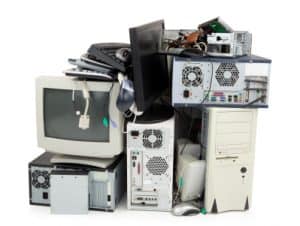Computer & Electronics Recycling hamilton & Burlinton

Electronics Recycling hamilton

Free Electronics Pick-up
Quick & 100% Free. Eco-Responsive. Premier Quality Service. Free HDD Certificate.


Recycling Items
PC, Printer, Television, Screen, Laptop, Phone, accessorie… All your Electronics Equiptment
100 &+ Drop-off Areas. Quick & 100% Free Pickup. Electronics & Computers Recycling in hamilton & burlington.
Free Certificate. Disposal EWaste Center. PC, Laptop, LCD, Phone, Printer…
Many centers near you where you can drop-off all your recyclable items. We Recycle all your Computer, laptop, printer, accessorie, screen, electronic…
The Advancement of Electronic Recycling in Canada
In February 2011, an article by the journalist Etienne Plamondon Emond appeared on the site of Le Devoir. Entitled « Electronic Waste – Québec produces » and eliminates 9,500 tons of electronic tailings annually « , the article questions the delay of the Quebec province in the management of electronic waste even if municipalities like Montreal and Quebec are Already equipped with recovery programs.
The author notes the existence of a partnership between CFER (Recycling Enterprise Training Centers), Bureau en gros and Recyc-Québec, known as « Mission Zéro électronique ».
Pending the Quebec regulation on the management of electronic waste, scheduled to be adopted in 2010, this partnership involves the recovery of electronic equipment (computers, mobile phones, cameras, etc.) that are no longer used by the public to dismantle them And send the parts to foundries or recyclers accredited by Recyc-Québec.
Electronic Recycling: Acting Well Before Regulatory Adoption
For example, 2,000 tonnes of material diverted from landfill sites were recorded four years after the project was started. According to Dominique Potelle of Recyc-Québec « There is an increase in what we collect year after year ».
This is already an important step in electronic recycling, although it should be noted that the author also notes that a Recyc-Québec study on residual materials in the residential sector reveals that more than 9,500 tonnes Of electronic products (1.3 kg / person) failed in disposal sites every year, while 80% of this equipment could have been recycled.
Electronic and Ecowear Recycling
In July 2012, ARPE-Quebec (Association for the recycling of electronic products in Quebec) announces the implementation of the Quebec program, which seeks to recover and re-evaluate products electronically. This period marks the entry into force of the Regulation on the recovery and recovery of products by companies whose Phase I is launched on 1 October 2012.
This program makes it possible to divert landfills from electronic devices that are no longer used in Quebec since they are sent to Quebec’s recycling and recycling professionals certified by the Recycler Qualification Office (RQO).
It is noted that the program is funded by consumer recuperation costs at the time of purchase of a new product and that these environmental management fees are based on the average costs associated with the recycling of the electronic device, From « $ 0.10 for a cellphone to $ 42.50 for a screen more than 29 inches » according to the site of Francois Charron.
Also referred to as « ecofrais », these fees applied to Phase I of the Regulations for cell phones, personal computers, televisions, readers, printers, scanners and photocopiers.
Continuity and efficiency in actions to promote electronic recycling
The Newswire website announces that since July 14, 2012, the non-profit management organization ARPE-Québec has funded the recovery programs that the municipalities of Montréal, Québec, Lévis, Sherbrooke and Rimouski have set up, as well as the program Recovery of Bureau en Gros stores in Quebec.
As a result, instead of joining landfill sites, electronic products that owners want to dispose of will be routed to eco-centers (Montreal: 7, Quebec: 5, Sherbrooke: 2, Lévis: 1, Rimouski: 1) and the Bureau en Gros drop-off points, of which there are 70.
To return to the ecofrais, it should be noted that in terms of displaying prices, companies can display environmental management costs provided that the total price, including the ecofrais, is displayed more clearly in relation to To the ecofrais itself and the price without ecofrais.
Electronic recycling: for which devices?
Pursuant to Phase II of the Regulation, ARPE-Quebec announces in July 2013 the addition, since the 14th of this month, of other electronic products to the list of those that the official deposit points of the network Of 450) accept while the application of ecofreams for this second phase is not expected to come into force until August 1, 2013, including digital cameras, portable and non-portable video game consoles, or location systems GPS for vehicles.
This reduces the number of electronic products accepted in these official drop-off points to more than a hundred, divided into twelve categories, including:
– Laptop :
• Laptop
• Notebook computers
• Tablet PCs
• Miniportables
• Mini-computers
– Desktop computers:
• Computer terminals
• Desktops serving as servers
• Thin clients or mini-desktops
• Desktop / tower servers
• Rack-mounted blade servers
• Rack mounted servers
– Computer peripherals and video game consoles:
• Mouse
• Ball-type mouse
• Keyboards
• Paving
• Touch pads
• Media Players
• Routers / Modems
• Loudspeakers
• External hard drives
• External floppy drives
• Numeric Keypads
• Graphic tablets without display
• HDMI switches
• Joysticks
• Game console controllers, balance boards, sensors and other input devices
• Hard Drive Duplicators
• Network Storage Devices (NAS)
• Integrated Media Terminal Adapters (EMTA)
• Cables *
• Connectors *
• Chargers *
• Remote controls *
• Memory cards *
• USB flash drives *
• Ink cartridges*
* Accepted at official ARPE-Québec drop-off points without being subject to ecofrais
– Display Devices:
• Televisions
• Computer monitors
• Professional display devices
• Closed Circuit Television Monitors
• All-in-one computers: a display with an integrated computer
• Smart Tables
• Graphic Tablets with Screen> 10 «
• Portable displays> 10 «
– Conventional telephones and answering machines:
• Conventional wired and wireless telephones using voice over IP telephony and satellite telephones
• Loudspeaker or conference phones
• Telephone answering machines (cassette or digital)
– Cellular telephones and pagers:
• Cellular phones, including those equipped with a camera, as well as video and / or audio recording
• Smartphones (cellular network)
• Personal digital assistants with touchscreen (cellular network)
• Mobile terminals (cellular network)
• Paging
– Printers, scanners, fax machines, photocopiers and multifunction devices:
• Office printers
• Printers with camera docking station
• Label printers, barcodes, cards
• Thermal printers
• Desktop scanners
• Business card desktop scanners
• Check Scanners
• Slide desktop scanners
• Office fax machines
• Office multifunction devices
– IT equipment on the ground:
• Printers on the ground
• Scanners on the ground
• Faxes on the ground
• Floor mounted fax machines with drum digitizer
• Photocopiers on the floor
• Multifunction or « all-in-one » devices on the floor that perform various tasks such as photocopying, scanning, faxing, or printing
• Servers and routers on the ground
– Portable / personal audio / video systems:
• AM / FM and portable satellite radios
• Clock radios
• Portable stereo systems including those that can connect to a wireless Internet
• Portable recorders and recorders
• Portable DVD players / recorders (CD, DVD, VHS, Blu-ray, etc.)
• MP3 players
• Portable Digital Players
• Docking stations for portable music players, smart phones and other portable devices
• Portable / compact speakers / for docking / folding bases (wired or wireless, including « Wi-Fi » and « Bluetooth » loudspeakers)
• Cassette recorders or digital audio / voice recorders
• Headphones, earphones and microphones
• Telephone headsets (with or without cord, including « Bluetooth »)
• Digital Cameras
• Digital photo key ring
• Video cameras / camcorders
• Personal digital assistants (PDAs)
• Multifunction satellite radios, including CD, MP3, FM radio or other audio functions
• Portable photographic business card / negative photo scanners
• Portable printers (eg portable photo printers)
• Web cameras
• Digital Picture Frames
• Portable screens – screen size <10 »
• Sound, image and wave generators
• Portable barcode readers
• Portable transceivers of the family radio service (FRS) / general mobile radio services • (SRMG) / portable transceivers / Portable Radio of Public Radio (CB)
• Portable video game systems
• E-book readers
• Portable satellite radio receivers
• Portable multimedia projectors
• Portable location systems (GPS)
• HD Antennas
• Video surveillance systems for babies
– Non-portable audio / video systems:
• Video recorders (VCR) / video projectors
• Digital Projectors
• Digital video recorders (DVR)
• Personal Video Recorders (PVR)
• Disc Players / Recorders
Vehicle audio / video and location systems:
Audio and / or video components and secondary market location for vehicles, including:
• Radios, DVD players, CDs and / or cassettes designed to be embedded (including those with built-in satellite radio and / or GPS functions)
• Amplifiers
• Frequency Equalizers
• Loudspeakers
• Video player systems
• Video display devices (including those with built-in tuners)
• Rear view camera
• Locating systems that are autonomous or designed to be embedded (examples: GPS receivers and their components)
– Home Theater Systems:
Home theater audio and video equipment sold in the same package from an original equipment manufacturer (OEM) with a single bar code, including:
• Audio Devices
• Audio / video equipment sold as a package / package for residential or non-residential use
The list of these devices that you can recycle is also available on the RecyclerMesElectroniques website. In addition, you can consult the Regulation respecting the recovery and valorization of products by businesses.
Why are we talking about electronic recycling?
It is important to continue and intensify the education of consumers, manufacturers and all stakeholders. Indeed, the manufacture, use and end of life of the electronic devices that we acquire have ecological impacts on our planet. It is therefore essential to support and encourage responsible manufacturing and consumption attitudes in order not to benefit from the technological advances to the detriment of the planet.
Here are some data that should allow us to open our eyes:
– Each year, 3% of extracted gold and silver, 13% of palladium and 15% of cobalt are consumed by telephones and laptops.
– Palladium can not be synthesized and has no substitute. It is the fifth non-renewable resource to be lost due to intensive human exploitation. Starting from the fact that in 2008 the stock was estimated at 3480 tons in exploitable fields and that the production rate was 232 tons per year, the final depletion of palladium is likely to take place in 2023.
– The consulting and research firm in the field of advanced technology Gartner estimates the number of mobile phones sold worldwide in the first quarter 2013 to 42.5 million.
– The extraction of the materials necessary for the manufacture of electronic equipment would be responsible for emissions of greenhouse gases equivalent to 23 million tons.
– Only one battery of an old cellphone containing cadmium is enough to contaminate 600,000 liters of water, which is equal to one third of the capacity of an Olympic swimming pool. It should be noted that the new batteries contain less and less cadmium.
Electronic recycling: yes, consumers can do something!
Recycler is an alternative that makes it possible to dispose of secondary raw materials, to manufacture new devices more environmentally friendly while preserving natural resources, and not to endanger the planet since electronic waste is not dumped into the environment. Or enter landfill and incineration sites or household waste.
For a more effective approach, changing consumer attitudes should be inseparable from electronic recycling. Let’s start with :
– Choose equipment certified to comply with strict environmental standards;
– Opt for energy efficient models with no futile and unnecessary options and technologies that would make the equipment more energy intensive;
– If purchasing computer equipment, consult the Greenpeace guide which lists the manufacturers according to the disposal of hazardous chemicals and their commitment to recycle their obsolete products in order to make the right choice.
– Keep a device as long as it is in good working order;
– Observe operating instructions to ensure correct operation.
In case our products need to be electronically recycled, we have several options. In the first place, there is no need to hesitate to contact the municipality in order to have as much information as possible.
In case the manufacturer has a program for the recovery and recycling of its products, it is possible to bring back the old equipment at the time of the new purchase.
.

